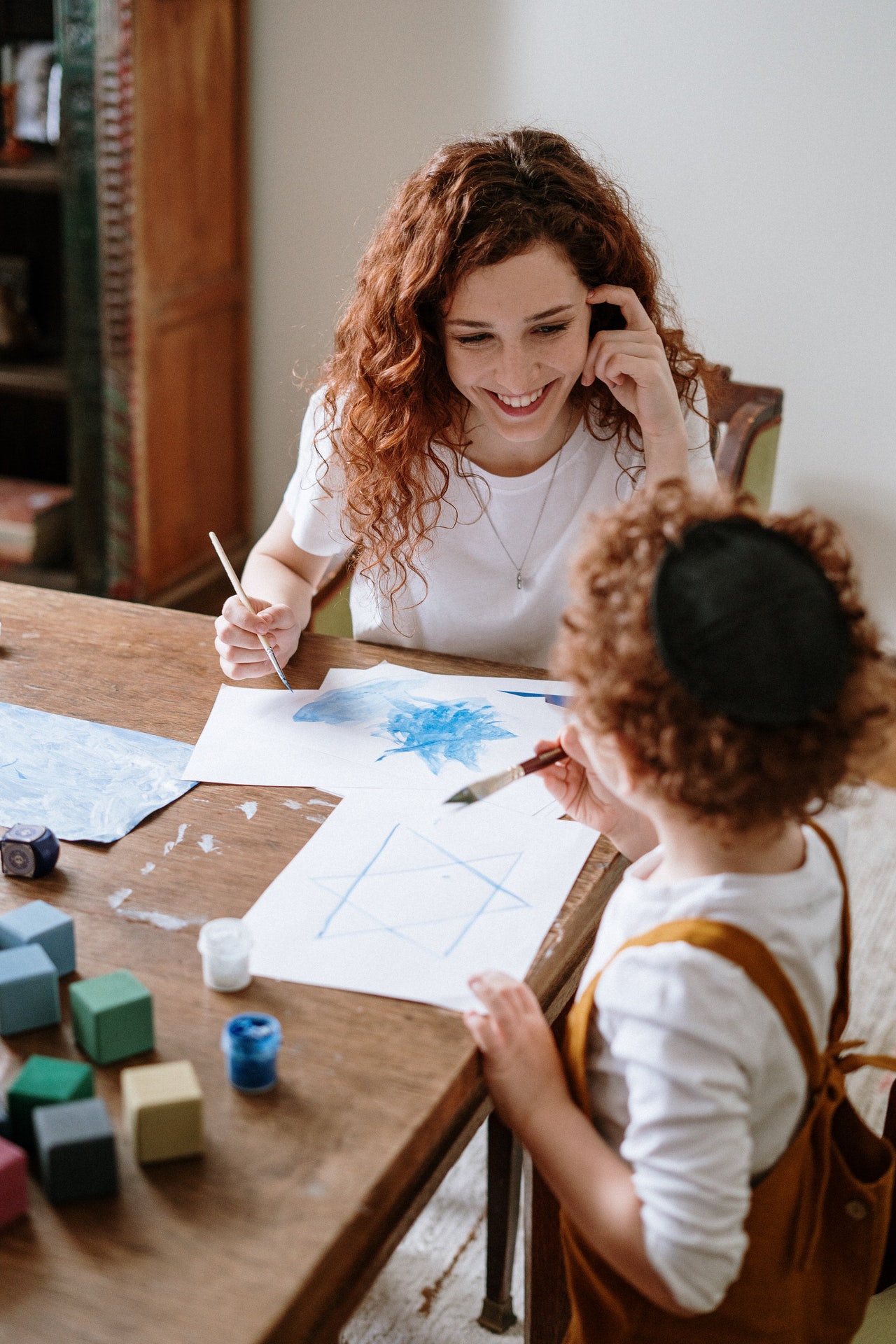
Every child is creative (O’connor, 2012), but some are more natural and gifted than others. Whether or not your child is creative, you can help them develop creativity in many unique ways.
However, before you begin to work on improving your child’s creative skills, you have to, first of all, identify the signs of creativity in your child. You have to discover the type of skills your child is endowed with.
Just like Steve Jobs’ adoptive father did! He discovered that Steve was always in the garage dismantling and coupling all kinds of electronic gadgets. Sometimes with his friend. Instead of the father to drive Steve away from the garage as many parents would, he gave him space and opportunity to try out his creative skills.
In the process, Steve tried different components or parts of those electronic gadgets to see how they work as a system. Over time, Steve was able to start designing and constructing his electronics. And ultimately, that creative skills brought about the emergence of Apple as an electronic company.
Presently, Apple products are the most qualitative and expensive in the market. So, with your nurturing and support, your child could be the next Steve Jobs, Warren Buffet (the most creative investor in the world), Bill Gates, Mark Zuckerberg, etc.
How Can I Raise My Child to Be More Creative?

There are multiple ways you can raise your child to be more creative. These are:
-
Give your child activities with a starter
Engage your child in some activities. Begin the process and allow them to complete it. For instance, write the title of a story and begin the story with a sentence or two. Then, allow the child to develop the story you’ve started to the end. Extend this to include some other areas such as legos, drawings paintings, etc.
-
Let your child be the teacher
Your child might have constructed a house or car using building blocks. Ask your child to teach you or explain how they constructed the house or car. If it’s a poem that you have written, ask him/her to explain the message of the poem. Being a teacher to you motivates your child to think of more other creative ways to do things.
-
Solicit your child’s help with problems
Let your child see you fail while doing a particular thing. It could be a game. Perhaps, you’re using a toy tablet to rearrange the 26 letters of the alphabet from A-Z. The letters were scattered, and you’ve made several attempts to rearrange the letters alphabetically but failed. Seek your child’s help to rearrange them. It teaches the child that he can learn creativity, and no one knows it all.
-
Be a model to your child
Demonstrate your creative skills for your child to see. When your child witnesses your work, he will like to emulate you. And even if your child’s creative expertise isn’t in the same area as yours, your creativity serves as a source of inspiration.
-
Support your child’s passion
Some parents take into consideration the areas of creativity that their children are interested in before they support or disapprove of it. For instance, they will prefer to support science inclined creative skills than arts. But regardless of whatever creative skills your child shows interest in or is passionate about, go all out to support him. Lionel Messi shows excellent creativity in football, and his father gave him the needed support. Messi rose through his football career to become the world’s best player six times.
-
Don’t condemn or criticize your child’s creative work
Avoid condemning or criticizing the creative works of your child. For instance, don’t tell your child that he/she didn’t paint the lion correctly. Or, the eyes are disproportionate. Instead, tell your child that he has tried to make the painting look like a real lion but it needs improvement.
-
Praise your child

Recognize and appreciate your child’s effort after accomplishing creative work. For instance, praise your child’s effort after completing a story you’ve started and asked him to complete. But the question is, how do you praise your child rightly? Praise your child’s effort instead of generalized praise. You can praise your child by saying: “You completed the story well because you had logical mental pictures of the characters”. Praise that focuses on effort encourages your child to repeat the creative behavior. Avoid generalized praise like “Good job!”
-
Reward your child
The essence of a reward is to reinforce positive behavior. Therefore, you should reward your child when he or she has accomplished or demonstrated exceptional creative abilities in his or her work. But you should limit the frequency of the reward. Otherwise, your child will soon become expectant of reward each time they accomplish a task. And this could negatively affect their creativity.
-
It’s not bad to fail
Teach your child to accept failure in the course of their creative work. Let your child know that failure propels creative thinking. When you fail, you give yourself time to sit back and think about other innovative ways to succeed in creating a product. When Thomas Edison was asked whether his inability to invent the light bulb over 10 000 times was a failure, he said, “I have not failed. I’ve just found 10 000 ways that won’t work.” But eventually, Edison succeeded with persistence and hard work.
-
Get involved and introduce your child to many areas of creativity

Organize some creative activities with your child. Begin with the ones your child is conversant with. Give your child some level of freedom to lead the activities. Gradually, expand the creative activities to include some other areas or fields of human endeavour.
-
Encourage your child to ask questions
One of the characteristics of a creative personality is questioning. Emphasize on your child to ask questions when they don’t understand a given concept. This could be when you’re teaching them particular creative skills or when they’re trying to figure out an imaginative concept.
-
Divergent viewpoint
Teach your child how to think differently from others. Let your child learn to view things from a different perspective than those of their peers. Riddles and jokes are one activity that can make your child think differently.
-
Ask your child to participate in competitions that are inclined to their creativity
If your child is very good at painting, let them participate in painting competitions. Just identify those areas or fields that your child has demonstrated high creative skills and let them take part in competitions in those areas. Taking part in competitions allows your child to learn from other participants. It’ll motivate your child to put in more effort to improve themselves.
-
Let your child be bored occasionally
You should let your child get bored, intermittently. Those moments of boredom are good for creative thinking. It’s a time that children daydream. During daydreaming, a lot of creative ideas emerge. The child tries to figure out what to do or how to solve problems that they might have left unattended to.
-
Give your child the needed materials and tools for creativity
If your child is good at writing, buy many storybooks for him/her. And if the child is good at football, get him a football and football kits. Make the required materials and tools available. It’ll make your child engage in more creative activities thereby improving their productivity.
-
Allow your child to get involved in free play

Your child needs unstructured play to navigate through different forms of creative play. Free play is critical in the development of creative skills in children. Therefore, allow your child to own their own space and time to play without interference.
-
Control the level of distractions
Try to limit the time your child spends playing games and/or computer. Because they’re a major source of distractions to children’s involvement in creative activities. Reducing the time your child spends on the computer gives them sufficient time to engage in other creative activities.
-
Don’t set too many rules

Minimize the number of rules you set for your creative child. To be more creative, your child needs a few rules to allow them sufficient time to engage in different activities. More time means more creative involvement and greater potentials to hone his skills.
-
Let your child acquire in-depth knowledge and skills of their creativity
Whatever creative skills your child is endowed with, you need to allow them to acquire some in-depth knowledge and skills through training. If your child is good at the guitar, you should enroll him/her in music lessons.
-
Visit interesting places
Take your child to places they’re interested in. These places have the potentials to spark your child’s creative imaginative thinking. A visit to an automobile company, for instance, can steer up the creative imagination of your child. When your child sees how cars are produced, he is likely to ask many questions about the processes, materials, etc.
Conclusion
If your child is creative, all you need is to encourage and support him. And if your child shows no sign of creativity, you should engage him in different activities that’ll bring out his potential. After identifying your child’s creative skills, you should use the tips above to enhance his knowledge to a higher level.
Hope these above-mentioned points are useful to you. If you have any more ideas as to how you can help children be more creative, then drop in your suggestions in the comments below.
Happy parenting !!!
Creativity helps child to grow and convert their idea into reality. Thanks for covering such a amazing article.
That is very true. Thank you for reading!